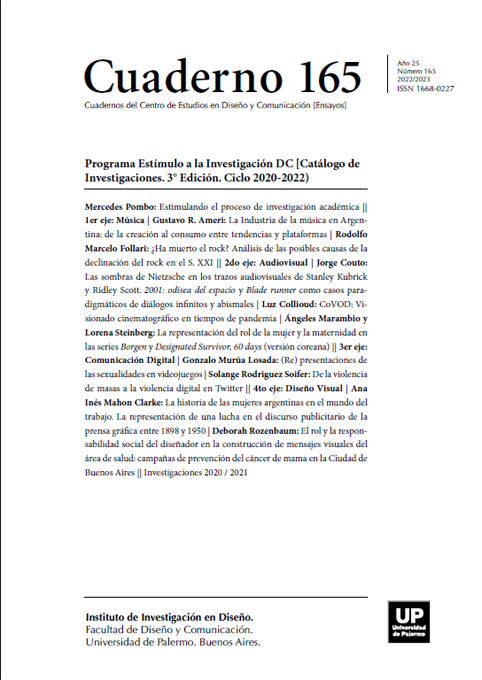(Re) presentaciones de las sexualidades en videojuegos
Abstract
This research arises from a mood of the times linked to the visibility of the LGBTIQ community, an aspect that is manifested in contemporary popular cultures. Day by day this issue is taking on a greater dimension, making us doubt our own structures in everyday life. Observing the broad success of the video game industry, which is five times the number of the film industry, the question arises: are there LGBTIQ characters in your narratives? Carrying out a superficial analysis we can affirm that yes, in fact, in recent years they have grown. I intend to survey and analyze the representations of dissident sexualities in a corpus of video games from different genres and years. In this way, it will be possible to observe if there are variations over the years in the stories and plot lines, as well as the way of narrating them. The titles will be The Sims (1999), Dragon Age: Inquisition (2012), and Overwatch (2015). Likewise, we will reflect on a mechanism that has existed since the genesis of video games whose users were mainly male. In a heteronormative society, it has been sought to include in these narratives female characters who embody heterosexual men. Unfolded bodies, virtual bodies where there is, as Lucia Santaella (2008) affirms, an “embodied identification” in these technological aesthetics.
References
Butler, J. (2006). Deshacer el género. Paidós
Butler, J. (2001). El ge´nero en disputa: El feminismo y la subversio´n de la identidad. Paido´s. Caillois, R. (1986). Los juegos y los hombres, la ma´scara y el ve´rtigo. Fondo de Cultura Econo´mica.
Diez, P. (1 de junio de 2020). BioWare recibe muchas críticas por sus personajes LGBT. Somos box. https://www.somosxbox.com/bioware-recibe-muchas-criticas-por-suspersonajes-lgbt/743703
Elliot, M. (27 de Agosto de 2020). The Sims knew I was queer before I did. Bricks Magazine. https://bricksmagazine.co.uk/2020/08/27/the-sims-knew-i-was-queer-before-i-did/
Fahey, M. (24 de marzo de 2011). Dragon Age II Writer Eloquently Defends The Game’s Sexuality Balance. Kotaku. https://kotaku.com/dragon-age-ii-writer-eloquently-defendsthe-games-sexua-5785306
Hardaker, C. (2013). Uh.... not to be nit- picky, but... the past tense of drag is dragged, not drug.”: An overview of trolling strategies. Journal of Language Aggression and Conflict, 58-86.
Huizinga, J. (2007). Homo Ludens. Alianza.
Mansilla, G. (2014). Yo nena, yo princesa. Universidad Nacional de General Sarmiento.
Murúa Losada, G. (2020). (27- 28 de febrero 2020). El videojuego como forma artística. [Ponencia].Congreso de Tendencias Escénicas y Audiovisuales, Buenos Aires, Argentina.
Murúa Losada, G. (2016). El píxel hace la fuerza: narrativa, cine y videojuegos en la era de las hipermediaciones. Aleph
Parkin, S. (18 de junio de 2014). The Kiss That Changed Video Games. The New Yorker. https://www.newyorker.com/tech/annals-of-technology/the-kiss-that-changed-video-games
Petit, C. [Feminist Frequency] (5 de marzo 2019). Is Ghirahim Gay or Just Coded That Way? | Queer Tropes in Video Games [Video]. Youtube. https://youtu.be/w-5jnTv-OMg
Preciado, B. (2009). El deseo homosexual. Terror Anal. Melusina
Preciado, B. (2002). Manifiesto contra-sexual. Opera prima Madrid
Red-Miau, A. (15 de noviembre de 2016). Omg: Dragon Age Inquisition, ¿A Quién Me Tiro?. Gaymer.es. https://www.gaymer.es/es/2016/11/dragon-age-inquisition-quien-tiro/
Sarkeesian, A. [Feminist Frequency] (7 de marzo 2013). Damsel in Distress: Part 1 - Tropes vs Women in Video Games [Video]. Youtube. https://youtu.be/X6p5AZp7r_Q
Shaw, A. (2014). Gaming at the edge – Sexuality and gender at the Margins of the gamer culture. University of Minnesota Press
Shaw, A. (15 de diciembre de 2015). LGBTQ Video Game Archive. Recuperado el dia 15 de diciembre de 2020 de https://lgbtqgamearchive.com/who-we-are/
Vespucci, G. (2011). Explorando una tri´ada conceptual: homosexualidad, familia y liberacio´n en el discurso del Frente de Liberacio´n Homosexual. Historia Cri´tica, 43, pp.174-197.
Zizek, S. (5 de octubre 2020). The real cyberspace. The European Graduate School. https://es.scribd.com/document/41010663/Slavoj-Zizek-The-Cyberspace-Real
Los autores/as que publiquen en esta revista ceden los derechos de autor y de publicación a "Cuadernos del Centro de Estudios de Diseño y Comunicación", Aceptando el registro de su trabajo bajo una licencia de atribución de Creative Commons, que permite a terceros utilizar lo publicado siempre que de el crédito pertinente a los autores y a esta revista.


